Badvertising
An Expose of Insipid, Insufferable, Ineffective Advertising
- 2021 INDIES Finalist
- Finalist, Business & Economics (Adult Nonfiction)
Badvertising is a marketing industry insider’s crabby compendium of the pitfalls that stymie advertising campaigns. In these essays, “Agents of Stupidity” are not inept spies, but trends that caused terrible ads. Drawing on his decades as a copywriter and executive, Jim Morris uses pithy maxims to begin each chapter.
Ad agencies do a lot of informed guesswork when it comes to selling their clients’ products and services—work that Morris calls “persuasive speculation.” Much of the challenge of making memorable ads comes down to trying to prove persuasiveness, he asserts. His chapters cover methods like metrics, neuromarketing, and segmented marketing to show that none are fail-proof. And there are other downfalls that make most ads bad ones, too. Committees, focus groups, and lawyers are about mitigating risk, and are therefore anti-creative; and too many clients stick with unoriginal concepts, or settle for “good enough.”
Morris’s insights draw on his years working in agencies and freelancing. They account for the fact that email sped demand for creative turnaround; Morris says that, now, slimmed-down and design-oriented agencies just don’t prioritize copy writing, or give creatives enough time.
This chatty work involves some repeating devices, but any smugness detected in its pages proves to be an act. Plentiful research is incorporated, both from within, and from outside of, the advertising sphere, including about how the brain functions. Despite the book’s exaggerated, salty tone, and its topical focus on what’s negative, Morris shows how ads contribute to culture, and proclaims a desire to see better ones.
Badvertising‘s insider’s look at the advertising business calls for more creativity and discusses the many obstacles that get in the way of making great ads.
Reviewed by
Meredith Grahl Counts
Disclosure: This article is not an endorsement, but a review. The publisher of this book provided free copies of the book to have their book reviewed by a professional reviewer. No fee was paid by the publisher for this review. Foreword Reviews only recommends books that we love. Foreword Magazine, Inc. is disclosing this in accordance with the Federal Trade Commission’s 16 CFR, Part 255.

